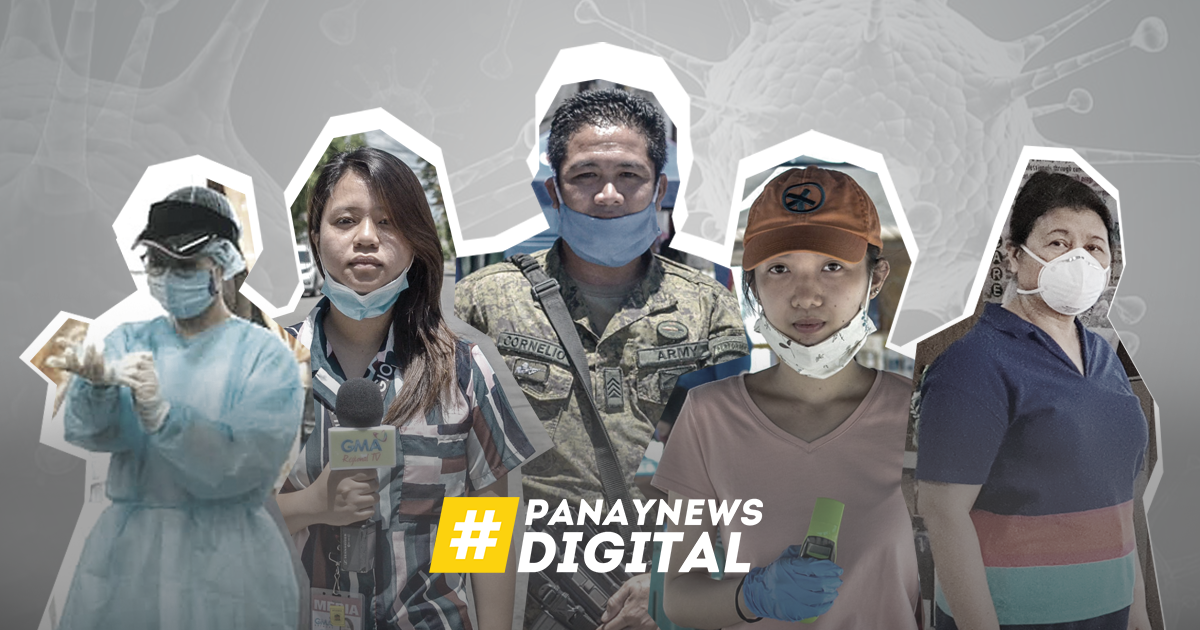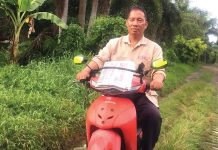IN tough times there are always those who step up, go above and beyond and do something that many would never think about doing.
Frontliners, this is what many calls them.
They risk their lives to provide essential services to their fellow countrymen in the time of an unprecedented crisis.
Every day, they trudge uncharted territories, all fearful of a formidable unseen enemy – the coronavirus disease 2019 (COVID-19).
Since the first cases were confirmed in December 2019, the virus causing a pneumonia-like disease exploded into a global pandemic. Countries around the world have imposed lockdowns and travel restrictions to slow down the contagion.
And when millions of people cocoon in self-protection, frontliners surge ahead right into the life-or-death battle.
They might be exhausted, frustrated and terrified.
Even so, they remain dedicated to serve and save lives. Panay News collected their stories of struggle and triumph during the COVID-19 pandemic.
THE HEALERS
“We are entering a war zone”
This is how Dr. Ellamae Sorongon-Divinagracia describes her recent days inside the walls of St. Paul’s Hospital in Iloilo City.

Since the new coronavirus reached the metro, the hospital’s emergency room has been filled to the rafters. Doors have swung almost non-stop, gurneys roll in all directions and nurses’ stations are swamped with patients suspected to have been infected by the virus.
And as statistics continue to balloon each day, the infectious disease physician is bearing the brunt of this pandemic.
“Days are now much fuller with the increasing number of persons suspected to have contracted the illness. They are all referred to me as the head of our Infection Prevention and Control Committee at St. Paul’s Hospital,” shares Sorongon-Divinagracia.
There is no recorded case of COVID-19 in the hospital yet the doctor is not leaving anything to chance.
Her work exposes her to the risk of contracting the virus. And the thought that she could carry it with her when she goes home is simply too much to bear.
“My only weapon from all of this is prayer,” she says. “I asked my friends and relatives to pray for me especially during this difficult time.”
Sorongon-Divinagracia is not new to her line of work. She has spent years in the same hospital but nothing prepared her and her colleagues for the rise of the new disease.
“The lack of adequate personal protective equipment (PPE) for our healthcare workers is our greatest challenge. To examine a PUI (persons under investigation) at the emergency room requires the use of PPE. If the number of PUIs increases, so does the number of PPE required,” laments Sorongon-Divinagracia.
The doctor knows very well the risks of her profession but this didn’t stop her from serving at the frontline of healthcare.
“Fear is the work of the devil. If you have faith and trust in God, you will have no fear and you don’t have to worry.”
***
Fear has also taken on a new meaning for Dr. Jamie Phill Duldoco, a family physician at the Iloilo Mission Hospital.

The long hours and the stress of managing a crowded emergency room are nothing compared to the fear of exposure to the same disease they are trying to extinguish. And that fear becomes more tangible as days go by.
“You never know if you will be spared from this disease even if you are equipped with personal protection. It gets even difficult when the number of patients is overwhelming and hospital equipment are lacking. Being a medical frontliner entails danger but I still took the risk and chose to face this pandemic. I became a doctor so I can serve the sick. I became a doctor so I can serve humanity,” says Duldoco.
Almost unrecognizable behind her masks, scrubs, gloves, and hairnets, the flimsy battle armor donned at the start of each shift, are her only barrier to contagion.
While concerned about her own safety, Dulduco also worries about the rest of her family.
“A few weeks ago, my brother (who was in Manila) told us that he may have been exposed to a possible COVID-19 patient. Knowing this and thinking that he was all alone in Manila, worried me,” she shares. “But I had to calm myself because I still have to go on duty. Prayer was my weapon. I also asked friends to pray for my brother’s health and safety. It’s good to have friends who are prayer warriors. And of course, I had to re-watch CLOY to stop myself from worrying. Captain Ri just calms my soul.”
There are never really good days inside a hospital. But in the time of coronavirus, there are just bad days and even worse days with no end in sight. With groundhog days full of circles and loops, Duldoco shares what replenishes her zeal.
“The Lord is my strength. My family is my strength. My beloved is my strength. A lot of things have happened along the way that may have caused me to just give up. But I still have so many dreams. I still haven’t given back to the Lord yet. I feel like I still haven’t known my purpose yet. Until I fulfill my dreams, give back to the Lord and realize my purpose, then I am not stopping,” Duldoco says.
***
It usually takes three cups of coffee – piping hot with two pumps of syrup – before she can start her work day.
These days, however, caffeine is of no use to Jhoan Marie Larlar.

For two weeks already, work hasn’t stopped for the City Health Office nurse. Days and hours have bled into each other.
Covered in face mask and gloves, Larlar’s daily routine is to check body temperature of motorists using a thermal scanner at a border checkpoint in Barangay Ungka, Jaro, Iloilo City.
Larlar knows all too well the perils of being exposed to COVID-19.
For all her resolve to stay and work, Larlar acknowledges there are moments when she prays that she can’t help but fear for both her family and colleagues.
“Ginakulbaan man pero gina obra ko ini para man sa safety sang iban and ma prevent ang pag spread ka virus,” she says. “Kun kis’a indi mo gid malikawan nga may mag reklamo. May mga driver nga mainit ang ulo pero okay lang kay controlled man namon ang tanan.”
It’s a brutal time for nurses across the country. Not that it wasn’t before.
For all the work they do and the hazards they face, nurses in the country only earn around P20,000 monthly on average – even lower for some private hospitals in the provinces.
The COVID-19 crisis may have added more hours but the pay hasn’t changed. But this hasn’t stopped Larlar, however.
THE ENFORCER
Philippine Army Sergeant Gilbert Cornelio will be the first to admit that he’s no Superman. He has no special powers, unless his expertise as a government soldier counts.

Cornelio, a native of Cebu City, is currently assigned as a team leader to man a border checkpoint in Barangay Ungka, Jaro, Iloilo City.
He, too, knows very well the perils of waging war on an enemy that wouldn’t need bullets to defeat.
It’s different from the conventional combats he is used to fighting.
After the city was placed under enhanced community quarantine, Cornelio’s job is to maintain peace and order at checkpoints.
A decent sleep has become an almost unattainable luxury.
“We have a short sleep and rest. Naga bulos-bulos kami duty adlaw kag gab-i,” shares Cornelio.
For him, it’s just about doing his job and making good on his word – even as fear and exhaustion hang heavily in the air.
“Naga antos kami sang init kag kulba nga basi ma infect man kami pero bilang isa ka suldado, may obligasyon kita sa tawo,” says Cornelio.
But the warrior is less worried about himself.
“Mas worried ako sa family ko. Tama ka budlay when you are away from them,” shares Cornelio,
Some 391 soldiers have been deployed in different quarantine control points to contain the spread of COVID-19 in Panay. They ware tasked to augment local authorities manning border points of the provinces of Iloilo, Capiz and Antique as well as to the entry points from and to Iloilo City.
THE COMMUNICATOR
When most people are forced to stay home due to the enforced community quarantine, Darylle Marie Sarmiento, are among the few who continues to serve various communities in Western Visayas as a journalist.

The constant stream of local news, especially with the increasing number of COVID-19 cases, may be overwhelming to Darylle, who is one of the Regional Correspondents of One Western Visayas, but she remains committed to her profession.
“Being away from home is the most challenging part of covering this pandemic. This is the longest time I was away from my family. But the best thing about this is I get to spare them from possible exposure to the virus. The rest of it is a day to day struggle,” shares Sarmiento.
“It’s a tough call between is this worth the risk or is this supposed to be the time where passion and calling comes in? Every day, you try to rebut your thoughts of fear with faith and obligation to serve the nation. It gives you a boost of morale when people rely on to you for them to have access to accurate news and information,” Sarmiento says.
Darylle, a broadcasting graduate, prays and longs for the day when all of this will be over, when Western Visayas and the rest of the Philippines will be COVID-free so she can be with her family.
When asked what makes her smile amid these challenging times, Darylle answers: “Strangers nodding back at me while I on bike from the station to where I reside. I feel a certain connection with random people on the streets hoping that one day I could meet them again in a safer environment, free from anxiety. As of now, #spreadkindness is much needed.”
No medicine has been approved, so far, for the coronavirus and a vaccine is still in the works. And there’s no telling when the COVID-19 crisis in the Philippines will reach its peak and how much longer it’ll stay. But there’s one thing Darylle, this young trailblazing communicator, is certain about: her FAITH./PN





we work for bpo healthcare are we also considered frontliners? trying to stabilize the economy